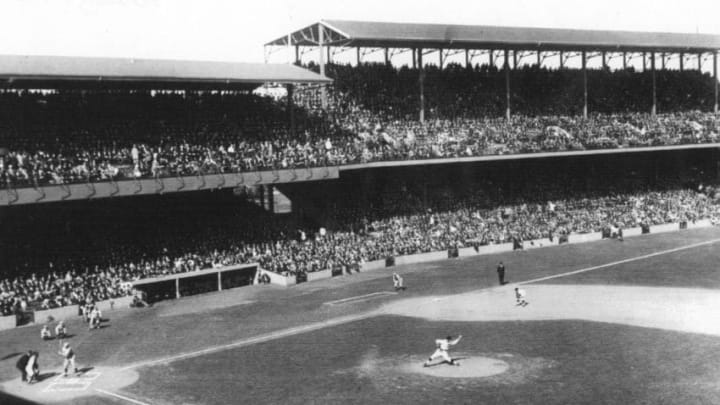
The Atlanta Braves franchise changed ownership four times since 1953, none of them left a mess like the non-sale of 1935.
Quinn didn’t become an owner of the franchise in 1935. He came in as more of a hired gun to save a failing company, a practice common in big business. The league and Frick swallowed their outrage that a person with ties to legal gambling at a race track own a baseball franchise, and was allowed to continue as principal owner, as long as he didn’t take part in running it publicly.
The league didn’t have the funds to settle the franchise’s outstanding debt and turned down a last-minute bid of $250K from a group wanting to move the team to Baltimore, because it wasn’t enough to clear the books.
Quinn decided his first action was to change the name, no one knows why. He held a contest that drew 1327 names from the people of Boston; the ultimate winner, Bees, was submitted 15 times.
Quinn, Casey Stengel, and future principal owner Louis Perini, finally bought Adams and the rest of the former owners out in 1941 and restored the Braves name.
The Judge
When a franchise like the Atlanta Braves is sold today, MLB requires the ownership group to provide proof they have the liquidity to take on and pay any debt incurred by the club. Unfortunately, Judge Fuchs got nothing.
The Governor of Massachusetts named Fuchs as chairman of the Unemployment Compensation Commission of Massachusetts, where he earned $6500 a year until he left the post in 1938. He filed for bankruptcy that September citing $263,299 in liabilities and no assets.
The following year he partnered in a law practice with his son until 1948, when his son left to join the National Labor Relations Board. He remained a regular at Braves’ home games until the team left Boston in 1953. He attended Red Sox games as well, as a guest of ownership, and was in the clubhouse to shake Ted Williams‘ hand after his last game in 1960.
After his death in 1961, the Sporting news described his legacy.
"“His career was not a bright one. There is this, though, to be said. With his own resources, he kept alive a franchise that would have collapsed. He kept it in Boston, where the Braves lasted for almost two more decades before the franchise was moved to Milwaukee. For these efforts, baseball should be grateful to Emil Fuchs, though futile and unrewarding was his role.”"
Each year, the Boston chapter of the BBWAA present the Judge Emil Fuchs Memorial Award for “long and meritorious service to baseball.” Recipients include Willie Mays, Pedro Martinez, Bill James, Marvin Miller, Hank Aaron, and Peter Gammons.
That’s a wrap
As Atlanta Braves fans, we get wrapped up in what’s happening today and spend little time appreciating what it to for the franchise to remain in existence today.
Emil Fuchs left a highly successful career as a judge, to pour his heart, soul, and every penny he had into the game he loved. Fuchs and Mathewson set out to do things in a certain way, as James C. O’Leary of the Boston Globe noted when Fuchs acquired the team.
"“He wants his team to win, but he wants it to win without resorting to tactics that will injure players, that take an unfair advantage of opponents, or that offend the high ideals of patrons. … The new Braves will stand for only that which is clean and aboveboard. Fuchs wants the Braves to be a family.”"
Success is relative; while he owned them the Braves never placed higher than fourth; perhaps that’s not “success” as most perceive it. However, I’d say that Fuchs would look at the Atlanta Braves and say, that’s the kind of team I wanted to build.
I call that success.
